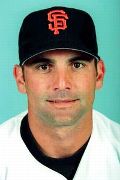|
This was supposed to be a column about injustice. I wanted to write about how men like Fernando Vina, David Justice and F.P. Santangelo -- former major league baseball players now working in the sports media -- should be suspended by their employers until it can be determined whether the Mitchell report was correct in labeling them as steroid/HGH-aided cheaters. I wanted to ask how anybody could trust men who violated Article 1 of the Sports Constitution (We the Fans demand honest play...) to deliver fair and balanced coverage. I wanted to know where Vina's voice was when the topic of cheating was broached on "Baseball Tonight"; where Justice was when -- as a game and studio analyst for the Yankees' YES Network -- Roger Clemens was discharging 95 mph bullets at age 934. Mostly, I wanted to know how Santangelo -- a former journeyman now hosting a morning radio show on Sacramento's KHTK-AM -- could have me on the air and ask, with apparent integrity, "Do you really think this stuff even helps someone hit a baseball? I mean, how do you know for sure?" In short, I wanted heads to roll. Yet here I am, in the wake of a 45-minute phone conversation with Santangelo, experiencing an emotion I had not felt in the six years since Sports Illustrated's Tom Verducci broke open the hidden steroids-and-baseball vault with "Confessions of an MVP," his June 3, 2002 cover story on Ken Caminiti's injectionary (admittedly a made-up word) ways. I am feeling -- of all things -- sympathetic. I called Santangelo to interview him about the contradictions between his baseball and broadcaster actions. But the subject matter quickly turned to remorse. In the days following the Mitchell report's release, Santangelo says he was subjected to more humiliation and ridicule than at any other point in his life. There were TV cameras positioned outside his home, cruel comments made toward his children, joke after joke at his expense. "I know I made a horrible mistake," he said. "I'm trying to take responsibility for it." My initial response to Santangelo was boo-hoo. "It was your doing," I callously lectured him. "Nobody told you to use." Then I thought about it. I thought about, well, me. My life. My personal garbage. Back in the early 1990s, I kicked off my journalistic career as a features writer at The Tennessean in Nashville. Hired by a metro daily, making a whopping $26,000 per year and owning my own downtown pad (as well as the ultimate babe-magnet -- a cherry red Geo Metro convertible), I convinced myself that I was the world's greatest scribe. Cocky and juvenile, I took advice from absolutely no one -- and it showed. My copy was littered with errors, one more egregious than the next. In a 2,500-word profile of a local band named Dreaming in English, I referred to the lead singer as Tyrone Brooks (his last name was Banks). I butchered the identities of legendary politicians, called Sheryl Crow's "Leaving Las Vegas" "Viva Las Vegas," etc. Finally my editor -- a wonderful woman named Catherine Mayhew -- pulled me aside and said, "Here's the reality -- keep this up and you don't have a job." Uh, what? "You'll be fired." Those words really sunk in. The point is, we all have our pasts; we all have our fair share of inexcusable, so-called unforgivable blunders. I butchered names. Chris Webber called that timeout. Thurman Thomas lost his helmet in a Super Bowl. Kermit Washington slugged an opponent. Charles Barkley spat on a little girl. Juan Marichal clubbed Johnny Roseboro with a bat. Leon Lett tested positive for drugs. F.P. Santangelo juiced. In sports (really, in life) the list of transgressions is endless. Athletes are born, athletes excel, athletes screw up for the world to see. Yet what matters -- what should matter, at least -- is what we do with our second chances. Do I believe men like Santangelo and Vina deserve credit for coming clean in the aftermath of the Mitchell report? Not especially. (They would have shown true guts if they'd come clean before its release). But if -- as the Bible claims -- all sins are equal, should my litany of screwups be any less career-crushing than those of a job-seeking ex-ballplayer? In the days following the Mitchell report's release, Santangelo was often browbeaten on his show, ripped as a liar and a fraud. While the barbs hurt, something in the former infielder was set free. Santangelo spoke openly about the guilt; about the shame; about having once been hailed as a scrapper and now watching his reputation dissolve like Sweet'N Low in a glass of water. "I'm glad it's out," he says. "It should be." Santangelo has decided to turn a negative into a positive. He plans to speak to Bay Area schoolchildren about the evils of performance enhancers; about the fool's gold that is cheating in order to reach a dream. "It does horrible stuff to you physically ... makes you someone you're not," he says. "But the worst is what it does to your integrity." He desperately wants to continue his work in the media and -- in this writer's opinion -- deserves the opportunity. For Santangelo, the truth has been painful. It has been embarrassing. It has been depressing. And it has set him free. Jeff Pearlman is a former Sports Illustrated senior writer and the author of "Love Me, Hate Me: Barry Bonds and the Making of an Antihero," now available in paperback. You can reach him at anngold22@gmail.com.
|

